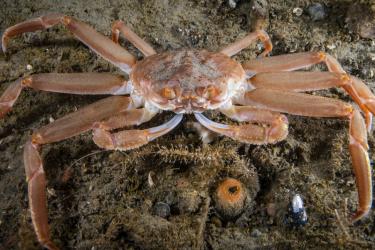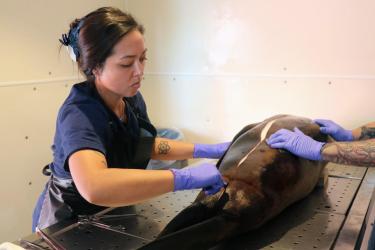NOAA Fisheries is inviting public comments on a new Draft Environmental Impact Statement (DEIS) that evaluates the Makah Tribe’s request to resume treaty-based hunting of eastern North Pacific gray whales for ceremonial and subsistence purposes.
The Makah seek to hunt gray whales from the eastern North Pacific stock, which is fully recovered from historic whaling and was removed from the list of threatened and endangered species in 1994. The eastern North Pacific population is estimated to number about 20,000 whales.
The Makah tribe historically hunted gray whales for subsistence and ceremonial purposes, relying on their treaty right of whaling. In 2004, the U.S. Court of Appeals for the Ninth Circuit ruled that in order to engage in these hunts, the Makah must also comply with the subsistence take provisions of the Marine Mammal Protection Act. Hunts were discontinued until that process was complete. Following the court ruling, the tribe prepared a request to NOAA Fisheries to allow take of up to 5 whales per year. This draft environmental impact statement analyzes the impacts of granting that request.
“This is the first step in a public process of considering this request that could eventually lead to authorization for the tribe to hunt gray whales,” said Donna Darm, associate deputy regional administrator for NOAA Fisheries’ West Coast Region. “This is the public’s opportunity to look at the alternatives we’ve developed, and let us know if we have fully and completely analyzed the impacts.”
A final environmental impact statement, various consultations, and rulemaking with public comment must follow.
The DEIS evaluates different alternatives for action, including an alternative that would authorize the tribe to take up to five whales per year off the Washington Coast under different seasons and limitations, and an alternative that would continue to prohibit the Makah from hunting gray whales. The DEIS is available online and will be open to public comment for 90 days.
For more information on the DEIS, the Makah request to hunt grey whales and to submit comments, go to http://www.westcoast.fisheries.noaa.gov/protected_species/marine_mammals/cetaceans/whale_hunt.html. NOAA Fisheries is also planning public meetings to gather information and comments on the document. The agency will announce those online and via email when the dates and other logistics have been finalized.
NOAA’s mission is to understand and predict changes in the Earth's environment, from the depths of the ocean to the surface of the sun, and to conserve and manage our coastal and marine resources. Join us on Twitter, Facebook, Instagram and our other social media channels.


